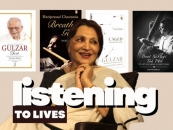_(1)-853X543.jpg)
More than a woman: Gajra Kottary
by Vinta Nanda March 15 2021, 12:00 am Estimated Reading Time: 14 mins, 21 secsVinta Nanda grabs an opportunity to talk to author and screenwriter Gajra Kottary about her work and also her latest release Not Woman Enough.
Who doesn’t know Gajra Kottary? If you’ve not read her books then you’ve seen one of the many television serials and films that she’s written. The Shonda Rhimes of India is what I often call her, because she is always that one person, in the industry of storytelling, who has her finger on the pulse of the times.
Gajra debuted as an author in early 1996 with her first collection of women-centric short stories titled Fragile Victories, followed by another compendium, The Last Laugh. Subsequently she co-authored her first original Hindi novel, Kora Kaagaz. Her novel Once Upon a Star was released in 2014.
She started her journey as a scriptwriter and associate with Mahesh Bhatt. Her first independent work for television was the serial Hamare Tumhare for Vishesh Films, followed by her first long running daily soap opera, the award-winning Astitva – Ek Prem Kahani. She has also developed the story of the acclaimed television serial Balika Vadhu, a series that took a stand against several social evils in Indian society, starting with child marriage.
Gajra has written the story for the historical television serial Buddha. More acclaimed television serials, which she has written include Jyoti, Godh Bharai, Panaah, Ghar Ek Sapna and Ek Veer ki Ardaas – Veera, Satrangi Sasuraal.
I had a conversation with Gajra about the latest book she has authored - Not Woman Enough.
Published by Juggernaut Publications, it is the coming of age story of a girl in search of her sexual identity and finding love. It is set in the semi-rural and patriarchal society of a small town in Rajasthan, India, where a young girl Devi struggles in silence to find her own sexual identity in a society that only wants sons. Her father had walked out on his family after refusing to have her aborted. Ever since then, both Babuji and Mai have loved her “just like a son.”
Devi grows up a tomboy. Her parents never worry about what the very impressionable rural society thinks of how they’re raising her, and they encourage her to live life on her own terms. When she goes to college, to pursue her dreams of studying agriculture, she meets Ishwari, who is also her roommate.
Ishwari’s parents want her to get married to a boy who is the son of a local politician, and she romantisices a life with him. But as she gets to know him better, Giridhar’s chauvinistic behaviour drives her away, and subconsciously, she finds that she is attracted to the sensitive and tender Devi. When Ishwari and Devi profess their love for each other, they are compelled to keep it a secret. Their curiosity about Devi’s state of mind leads them to explore possibilities of a sex change operation.
Shocked by the news when they’re told by Devi about what she wants to do, Babuji and Mai, adjust but the opposition comes from Ishwari’s parents who rush to get her married to Girdhar. While Devi begins the hormonal treatment for her sex change operation, Giridhar, who is rejected by Ishwari, spitefully rapes her.
Ishwari, recovering from the brutality of rape, and Devi, undergoing physiological transformation, start to heal themselves while also fighting their tormentors.
Over to the conversation I had with Gajra Kottary - about her latest release, and many other things:
_(4).jpg)
How do you see your progression as an author from your first book, which was published to Not Woman Enough?
Well actually, though it is difficult to self-analyse and be really objective about this, the fact remains that I realise that I have come a long way. The first book was a hesitant effort in short format, but it gave me the confidence to embark on that journey. Each book has been a step ahead… and with Not Woman Enough I think I have pushed the envelope further.
Writing it, made me uncomfortable and maybe the readers of this book might be shocked that it’s coming from me… But I am so glad I wrote it.
What made you want to explore the relationship between two women?
While loads has been written about “same sex” relationships, I think Not Woman Enough is a bit different. It is about how a traumatic incident impacts the psyche of a girl, and how she believes that she is trapped in the wrong body. When that gets corroborated by a psychiatrist, the rustic feminist in her decides to take appropriate action and to give herself a life that she wants and deserves. A life that includes love, family and respect. The girl in the protagonist’s life is very different, but she grows to be bold and a believer in feminism. Not Woman Enough is a story that is totally out from my comfort zone, but I needed to put myself through thinking and writing differently and making that bigger effort to relate to my characters as I have always related…
It is very interesting that you have set your protagonists in a place and culture, which is yet not fully prepared to accept same sex relationships and marriages - what were your reasons to do that?
You are absolutely right. Setting the story in an urban scenario would have made it one more in a list of such stories, but the stakes are so much higher for characters who belong to the first generation that is crying out for change in their world. As we all know, we have several Indias within one India… the dichotomy between Bharat and India has to narrow down. That happens for my characters who find the contrast between their immediate world and the world that mobile phones and the internet have opened up for them. What’s also interesting is how these young girls learn to bridge the gap - not just for themselves but also for their parents - and prove that love can conquer all. Setting it in rural India gave me so much more to play with in terms of the angst of my main characters.
_(6).jpg)
Do you know Devi and Ishwari by other names in real life, or are they purely fiction? - either ways please expand on the answer.
This time, I knew of no Devi or Ishwari when I started writing, so in that sense they are purely fictional. But surprisingly, I discovered several of them as I started researching the psychological and the medical aspects of such a situation. Then too my Devi’s and Ishwari’s usually came from small towns and semi-urbanised parts of India, not really real and rural India. So it was interesting to keep these characters in their villages, especially to start with.
What inspires you to write?
Ha ha Ha… life itself I suppose! But I guess that’s too generic an answer. Being more specific - it’s the real life news and stories that have a way of tickling my imagination. Sometimes what becomes of those stories is so different from where they started that I find myself shocked at what I’ve done. But these news stories certainly serve as great take off points for me - diving boards if they can be described that way. So often I find that life is stranger than fiction and that I have to tailor the quirky facts that inspire me in such a way, that it does not come across as total fiction, even when it’s actually completely fact….
Do you prefer writing screenplays or books? And why?
As I am growing older, it’s books, as deadlines are not as stifling. But then if someone asked me to choose I would not be able to select one over the other. Even after 20 years of scriptwriting, I still feel the kick of seeing my characters become alive on screen. And that interaction with colleagues is what I am afraid of missing if I were to choose only writing books. The writing of books is an ego trip and the writing of a script is a lesson in humility… Donon ka apna mazaa hai.
Which are the writers/authors among contemporary women writers/authors whom you admire and why?
Somehow, since I get very little time to relax and read, I like to read feel good, even funny authors who write very differently from me. I love to read Sudha Moorthy - she is totally simple and writes happy stories from the heart. I also love Twinkle Khanna for her sardonic humour. While Sudha Moorthy keeps me in touch with middle class moorings, Twinkle Khanna with her touch of glamour and class helps me understand a world very different from mine.
_(5).jpg)
What is it you are working on right now and what's next? - in both television/OTT and books?
These days I am busy with the story of a Netflix project and am enjoying the difference of pace and grammar that its writing entails. There’s also this very big TV project that will surprise viewers very soon, coming up in early June, but I can’t talk about it in public.
Books there will be aplenty this year, thanks to the time one got to write during the pandemic. There’s a 10 episode Hindi audio series -another genre that I find very interesting. Then there is my first book of non-fiction on the Healing Power of Movies with Hay House Publishers releasing in May. There’s two more novels that I am just brushing up and my first historical fiction releasing around mid-year. It’s a happy balance and I am counting my blessings.
So then here below is an excerpt from the book:
Devi went to class but she couldn’t get that girl out of her mind and she didn’t even know her name. At lunch it was the same, she kept wondering who the girl was and had no appetite for food. She tried to check herself, her thoughts. What was happening to her? She was acting like she was in love, except that this was a girl. And then, at other times, it seemed the most natural thing to her. Devi was very confused.
Things got only worse by evening. There was knock on the door of her room and when Devi answered it, Ishwari was standing outside with the Warden who said, ‘Devi, this is Ishwari and she will be sharing your room with you.’
Ishwari smiled with delight at Devi and Devi knew she was done for. She cordially let Ishwari in and helped her in settling down, but inside, she felt a strange desire for this girl, something she had never felt before. As she delicately undid the locks on one of her suitcases, she found herself looking at Ishwari the way boys would often look at other girls. This was just going to be very difficult. She barely knew this girl. She knew that she was going to have to hide her feelings very well indeed.
Ishwari was a shy girl herself but she wondered why Devi held back so much. She had heard about what had happened with Devi’s previous roommate Kamla Rathore, and put it down to “Devi missing her”. And so over the next few days, Devi stayed away while Ishwari tried to reach out to her. Kamla had been very welcoming towards Devi when she had just come to college, while Devi was being very cold and distant with Ishwari. There were only perfunctory greetings and cordial good mornings.
Early one morning, as Devi slept, Ishwari cried into her pillow. Giridhar had not called her for the last few days. She was miserable and had no one she could talk to. Devi didn’t seem like she would be interested at all in lending her shoulder for her to cry on. And the worst thing was that there were all kinds of situations going on in her head now. Was Giridhar still talking to Meera Maa in her absence? Would he come to visit the house despite Ishwari not being there?
Devi woke up to the sound of gentle sobs. Ishwari was curled up and facing the other way, holding on to a pillow tightly. She sighed. If she wasn’t warm now, it would just be inhumane.
‘What is the matter Ishwari?’ asked a concerned Devi. Ishwari looked up at her, with tear-stains on her cheeks, and before words could escape her mouth, there were tears. She was bawling now, and made Devi worried that someone from outside would hear them and wonder if everything was alright.
_(4).jpg)
Devi sat down beside Ishwari and heard her talk of why she had been sent to Udaipur. Ishwari told her about her stepmother who relished putting her down. She talked to Devi of how her father never had the time or the inclination to spend time with her. Ishwari then told Devi of how she saw her marriage to Giridhar as the only way out for her, and even about Pratap Mama.
Devi found herself a little dismayed at the fact that Ishwari was engaged but quickly brushed off her thoughts. This was about Ishwari, not herself, and at this time Ishwari required Devi to be a friend more than anything else. Ishwari just needed a hug, and Devi tried to be as platonic as she could. They began to attend classes together, study together and even hang out in the college campus together. The other girls noticed and wondered about their sudden camaraderie but Devi didn’t care. In her head this was what a good roommate would do, so she was doing nothing wrong.
Ishwari and Devi began going for long walks post dinner and talking about their lives. Ishwari realized Devi was very different from her and yet she thoroughly enjoyed her company. Giridhar would call up sometimes but even if he didn’t, Ishwari had stopped missing him so terribly. She admired the quiet self-confidence that Devi seems to exude, despite being so different from the other girls in the college.
It was a revelation for Ishwari one night when Devi told her that she would actually have not been alive if it hadn’t been for her father. ‘Really, your own grandfather tried to kill you?’ asked an incredulous Ishwari. Devi nodded her head and said, ‘So see, your stepmother is not that bad.’ At the mention of Meera, Ishwari was livid. She said, ‘Oh Devi, don’t get me started. Meera Maa is so friendly with Giridhar that it makes me uncomfortable. But then I cannot say anything because if I do, Maa will ensure Papa comes down hard on me.'
Devi thought for a moment and said, ‘I don’t think it will be that bad. When you haven’t tried talking to him, how can you say so? Who knows, even he may have noticed and must be wondering if he is in the wrong. You know Ishwari, our fathers are always softer than they let on.'
Ishwari had a smile on her face. ‘Devi, you love your father a lot don’t you?’ ‘He is the reason I can be who I am, and it is because of Mai and him that I am here. Trust me Ishwari, our parents are the only ones who will always love us no matter who and what we choose to be.’
Ishwari impulsively held Devi’s hand and said, ‘I feel the same about you too. That you love me no matter what I tell you. Devi, you can trust me too. I will always stand by you, whenever you need me.’
Devi smiled, but her heart was fluttering again, almost like her being was begging her to say something to Ishwari in that moment about how she felt and had been feeling. But how could she possibly know how Ishwari would react; she might hate Devi and never speak to her again. She didn’t want to make Ishwari feel like Rambhi had made her feel. Devi stared at the moon wondering if she was destined to be lonely for the rest of her life. As the end of term drew close, classes for Devi and Ishwari became very hectic. For the courses that they did have in common, they used to attend classes together, sitting together and sharing notes. The whole college knew that they were the best of friends, and one girl in particular observed patiently; Rambhi knew something about Devi that nobody else did.





-173X130.jpg)
-173X130.jpg)
-173X130.jpg)
-173X130.jpg)
-173X130.jpg)

